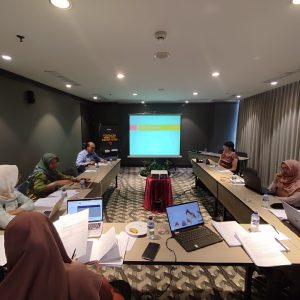EFFECTIVENESS STUDY ON THE INTEGRATION OF MICRONUTRIENT POWDER (MNP) INTO LOCAL FOOD BASED SCHOOL MEALS IN TIMOR TENGAH SELATAN (TTS) AND KUPANG DISTRICT OF NUSA TENGGARA TIMUR (NTT) PROVINCE
Principle Investigator:
Prof. dr. Siswanto Agus Wilopo, SU, M.Sc., Sc.D.
Co-PI:
Drs. Abdul Wahab, MPH
Investigators:
dr. Emi Huriyati, M.Kes
dr. Ifta Choiriyyah, MSPH
Dr. Dra. Sunarti, Apt, M.Kes
Agung Nugroho, MPH
dr. Prima Dhewi, M.Biotech.
dr. Citra Indriani, MPH
Althaf Setyawan, S.Si, MPH.
Mustikaningtyas, S.Psi.,Psi., MPH.
dr. Amirah Wahdi
EXECUTIVE SUMMARY
Despite notable economic and social progress in Indonesia, food insecurity, as well as child and maternal under-nutrition remain persistent challenges. In the past three years, the prevalence of stunting has increased from 35.6% to 37.2% nationwide, with much higher levels in the eastern provinces, such as East Nusa Tenggara, West Nusa Tenggara, Maluku, and West Papua. East Nusa Tenggara (Nusa Tenggara Timur, NTT) is one of the provinces that continues to face a combination of acute and chronic food insecurity, especially due to issues of food access and utilization, contributing to the severe under-nutrition among its population, particularly women and young children, as well as. As is expected with such high rates of under nutrition, micronutrient deficiencies are also concerning. NTT province has the highest levels of wasting, stunting and underweight children in Indonesia at 13.3%, 58% and 29% respectively. This level of prevalence is a serious public health concern, according to WHO criteria.
The WFP’s Project Laser Beam in Indonesia (PLBI) included various interventions to address both direct and underlying causes of under-nutrition throughout the life cycle of a child. The aim of the PLBI is to improve the nutrition and food security situation in NTT, Indonesia. Key target groups included school-aged children and their families in rural communities. The WFP in collaboration with the Indonesian Government distributed Micronutrient Powders (MNPs) for primary school children using the Local Food-Based School Meal Programme (LFBSMP).
Despite the wide body of primary research on MNP interventions, there are few syntheses of the existing data for school-aged children. This review shows that MNPs raise serum hemoglobin levels and reduce anemia significantly for children aged under 2 years old, not for school-aged children. In addition, the evidence on growth is also weak. These problems need to be resolved by conducting an effectiveness study before recommending the intervention for implementation at scale.
Therefore, the objectives of this study are:
a. To assess the effectiveness of micronutrients provision through Micronutrient Powders (MNP) in Local Food-Based School Meals (LFBSM) in Timor Tengah Selatan (TTS) District and Kupang District of NTT province;
b. To assess the effectiveness of BCC (Behavior Change Communication) materials in implementation of VITAS social marketing.
c. To collect key programmatic inputs for technical guidance that will support MNP distributions in school feeding projects.



